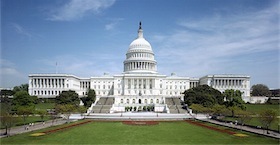Matthew Yglesias's Blog, page 2369
March 31, 2011
The DC Voucher Farce

There's something pathological about the perennial congressional debates over the DC "school voucher" program. The most important thing to understand about this is that it's not a school voucher program. The way the once (and possibly future) program works is this—the federal government gets some money together and gives it to poor kids in DC to pay their tuition to go to private school.
The formal name for the program was the "DC Opportunity Scholarship" program which was actually much more accurate than the "voucher" term. It worked exactly as if DC's rich uncle showed up one day with a sack full of money and started offering to use it to pay kids' tuition. And actually this kind of thing happens all the time. I went to private school when I grew up, and my grandparents paid for it. There are lots of things you could call that arrangement, but it's not a "school voucher" program at all. Nothing has been cashed out, no money follows the kids anywhere, there's no competitive pressure on DCPS, nothing.
And yet there's a kind of bipartisan conspiracy on the Hill to pretend that this is a high-stakes ideological battle. Republicans design a program that's not a voucher program, it's just a "free money for a small number of poor kids in the District of Columbia" program. Naturally that program is popular with poor families in the District of Columbia for the exact same reasons as a special "DC kids get extra SNAP benefits" or "DC kids get bonus Pell Grants" program would be popular. Then the popularity of the program is cynically deployed to make the case for actual voucher programs elsewhere. Consequently, all the stakeholders who don't like the idea of taking money out of public school systems band together to oppose the DC voucher program even though the program doesn't take any money out of public schools.
It'd be as if the Congressional GOP appropriated $10 million to let a lot of cute puppies loose on the streets in Washington but named them "school vouchers" and then everyone freaked out when Democrats started shooting puppies. It's cynical on all sides and really says nothing about education policy one way or the other.


Hail Kauffman Foundation
I'm heading off to Kansas City for a couple of days for a Kauffman Foundation conference for economic policy bloggers. As usual, posting will continue. I went to a version of this event two years ago, and I have to say that at the time I didn't really get what Kauffman was all about—it's a foundation for "entrepreneurship" which just kind of sounded like BS to me.
But I've come to appreciate that this is actually a really important idea in a way that often gets missed. The key thing comes in the form of the political claptrap you tend to hear about how small businesses create thirty billion percent of all new jobs. What actually happens is that growth in both employment and GDP is driven not so much by small firms as by rapidly expanding firms. This is something American political culture tends to get very badly wrong despite a lot of nominal worship of the ideal of entrepreneurship. Whenever politicians are feeling themselves in a "pro-business" growth oriented mood, what they tend to do is look around and talk to a bunch of rich businessmen. But if the United States succeeds over the next 30 years it won't be thanks to the executives of the firms of that are important today. It'll be thanks to the firms you've never heard of. This, not GE's exploitation of tax loopholes, is the real problem with the idea of brining Jeffrey Immelt on board for a "jobs council." In 1981, Microsoft and Apple and Cisco and Wal-Mart (see Krugman) weren't important companies and yet those are the companies that have been driving such improvements in living standards as we've managed to enjoy.
At any rate, I think it's an important idea and one that goes kind of unappreciated in a political debate that tends to be dominated by talking about the rich people of today. So here (again) is Kauffman on financialization and here's Kauffman on comparative effectiveness research.


The Blight of Hyper-Empowered Local Government

Lydia DePillis has a fascinating piece in the City Paper about why developers cluster their projects in specific neighborhoods. A lot of it just seems like basic good business sense, but some of it is an adaptation to regulatory dysfunction:
Developers who go big in a certain neighborhood follow a certain calculus. One major factor: D.C.'s ultra-empowered Advisory Neighborhood Commission system. While these hyperlocal bodies can't directly kill a project, they can certainly slow it down. In a business where investors get spooked when things drag on too long, that's often the same thing—which is why a long record of working with the locals is especially helpful. "The more time it takes to do anything, potentially the worse off the developer is," says Calvin Gladney, of the development consulting group Mosaic Urban Partners. "You have to get the ANC to weigh in, so the more you can leverage previous relationships, the better." [...]
ANCs can leverage concessions from large landowners, knowing that the company will have to come back looking for support for their next project. In Shaw, for instance, Douglas Development scatters tens of thousands of dollars every year in donations to local organizations, like a manor lord might spread charitable donations around the adjacent village.
If you look at this in a partial equilibrium framework, it may sound nice. The developer-ANC interaction is iterated, so the developers play nice with the ANCs, and that boosts allocations to local organizations.
But a big problem comes in the "investors get spooked" phase. The spookiness of investing in DC means the cost of capital is higher than it would otherwise be and the total quantity of investment is lower. That's good for incumbent landlords, and it also particularly disadvantages potential start-up firms which helps shelter large developers from competition. What's more, the ANC uncertainty factors also deters outside firms from coming into the city with projects, thus further sheltering DC's developers from competition. The upshot is that while I think ANC members think they're being "tough on developers," a large amount of what they're doing is creating monopoly rents for developers and then very partially splitting the proceeds with neighborhood nonprofits.


Partisanship a DC Export?

Molly Ball offers the intriguing thesis that toxic partisanship is being exported from Washington, DC into previously placid state capitols:
In capital after state capital, Washington's toxic culture is seeping in, suffocating local tradition and replacing it with the Beltway's unique contribution to American politics—the practice of permanent, total war. The shrill partisanship, hardball politics and legislative stalemate that marked Madison's recent turn in the national spotlight are becoming an increasingly familiar presence, exported from the national parties and the campaign tradesmen and special interests who run and finance their campaigns.
I'm not really sure that works if you try to take it super-literally, since our politicians in DC are winning elections back home in the provinces. But I do think there's something to this idea. We do seem to be seeing some kind of nationalization of state politics, where on the conservative side groups like ALEC and Americans for Prosperity have succeeded in creating a large level of uniformity on the conservative agenda in state capitols. That's created a fair degree of counter-uniformity as progressives push back. But this really is an asymmetrical phenomenon—the Cuomo and Brown administrations in New York and California don't show any side of a coordinated progressive theory of state governance.
As usual, I have no real problem with partisanship or hardball. Indeed, over the long run I think it bolsters democratic accountability when strong political parties present the public with coherent, focused choices. The issue is that we oftentimes have political institutions that assume the existence of loose, non-ideological parties, and the institutions will have to adjust.


Jamie Dimon Endorses Dodd-Frank

Nothing beats a fine whine from our Galtian overlords:
Jamie Dimon, chief executive of JPMorgan Chase, launched a broadside against financial regulation on Wednesday, warning that new capital rules could be "the nail in our coffin for big American banks". [...]
Mr Dimon's comments come as Wall Street executives and Republican members of Congress are starting to attack regulation as anger at the financial industry subsides. On Tuesday, Alan Greenspan, the former Federal Reserve chairman, wrote in the Financial Times that the Dodd-Frank financial reforms risked creating "the largest regulatory-induced market distortion since America's ill-fated imposition of wage and price controls in 1971".
Spencer Bachus, the Republican chairman of the House financial services committee, has said that regulators are there to "serve" the banks and warned the Treasury not to hurt Goldman Sachs' shareholders when it writes new rules implementing Dodd-Frank.
Personally, I see absolutely no reason to believe that anger at the financial industry has subsided. The Obama administration was softer on the financial industry than the public wanted, which played into the hands of the other political party. In an ideal world voters would have realized that the other political party wants to be even softer on the financial industry. But in the real world, that's not how it worked. But I think most people are still pretty damn angry at the financial industry and don't at all agree with Rep Bachus that the proper role of US public policy is to serve the bankers.
Indeed, what's missing in the entire Greenspan/Dimon charge against Dodd-Frank is some explanation of what would actually be bad about disadvantaging US-based banks relative to Europe-based ones. Banks located in an inadequately supervised country are necessarily going to have an advantage over banks in a better-supervised country. Just ask Iceland pre-crash. But the advantage stems from greater vulnerability to disastrous crashes. Just ask Iceland post-crash. Yves Smith points out that "the permanent growth losses of financial crises greatly exceed the benefits." As long as Dimon is whining about this point, we're doing something right.


Good Morning Libya

Today's New York Times features Mark Mazzetti and Eric Schmitt reporting that America's no boots on the ground humanitarian intervention in Libya features ground-based CIA agents (presumably wearing tennis shoes) coordinating with Libyan rebels so as to better be able to assist them with tactical air support. Chris Adams for McClatchy also has a story out headlined "Libyan rebel leader spent much of past 20 years in suburban Virginia", which is presumably because he really liked the Tyson's Corner mall and has nothing to do with the location of the CIA or the Pentagon.
Reuters also had it that Obama had signed a secret order to provide the Libyan rebels with weapons, but that presumably meant humanitarian weapons rather than the kind you use to kill enemy soldiers and resolve post-revolutionary political disputes with. The administration, however, denies that this decision has been made. Meanwhile, the Gaddafist state continues to disintegrate as foreign minister Moussa Koussa defected to the United Kingdom but Gaddafi's troops made advances on the ground.
Here at home "Challenged on whether Obama overstepped his constitutional authority in attacking Libya without congressional approval, Clinton told lawmakers that White House lawyers were OK with it and that Obama has no plans to seek an endorsement from Congress, attendees told POLITICO." People will criticize this executive power grab, but remember to also see it as an abdication of responsibility. Members of congress will complain about this, but they won't really do anything about it, nor will next year's defense appropriation bill (or the one after that or the one after that or …) contain any effort to constrain presidential warmaking power. That's because members of congress want to be kept in the dark, they want to be able to complain if things go poorly without taking ownership of the situation. And I think in adopting that attitude, members of congress demonstrate a rare bit of good sense. The level of uncertainty surrounding these activities is huge. There are unbounded downside risks all over the place. But instead of knowledge of those facts leading to greater hesitation about the profligate use of force, it just leads to a congressional flight from responsibility.


The Meaning of Interest Rates
One thing I'd say about the potential implications of a government shutdown on the bond market is that I think it's probably a mistake to see Treasury interest rates as primarily driven by default risk. If the government of El Salvador or Illinois borrows dollars, it might in the future run out of dollars and not repay its loan. But there's no reason the government of the United States should ever run out of dollars. It makes the dollars.
An increase in Treasury borrowing costs could be driven by hope or by fear. In the "hope" scenario, if investors increase their view of the growth outlook they'll become more willing to invest funds in things other than bonds and thus bond interest rates will have to go up. There's also a fear scenario, which would probably be about the value of the dollar. If you lend the US government some dollars, you're definitely going to get back the number of dollars that the US government promised you. But right now a dollar buys you about 0.70 euros and maybe five years from now it'll only buy you 0.65 euros, in which case lending euros to the Dutch government might look like a better bet than lending dollars to the USA. That would drive interest rates up, but it still wouldn't be default risk.


March 30, 2011
Endgame
Connaître le goût du péché:
— House GOP to pass magical budget.
— Collective bargaining for homeowners.
— With notably rare exceptions.
— Secret order authorizing support for Libyan rebels not so secret anymore.
— Indian state bands Gandhi book.
Yelle, my favorite French pop star, has a new album out. The title track is "Safari Disco Club" which is French for "safari disco club."


Blogging and Overconfidence

I'd been waiting for someone else to write an excellent response to this from Matthew Kahn, and Diane Lim Rogers delivers:
I think we female economists have our own empirical (not just theoretical) reasons why those of us who blog aren't the same people as those of us who are at the top of the REPEC list. In my case, it's also closely related to why those of us (even non-excellent female economists) who blog don't typically blog at the same frequency as the (even most excellent) male economists who blog. It's called we have and care about other things and people in our lives, not just our own individual, introspective views about how the supposed world around us supposedly works (in our own opinion)! And that's even things and people other than what Matthew counts so endearingly as the "home production" sort of things–you know, "cooking and rearing children."
But yes, we female economists who happen to have families do typically end up doing most of the home production, as our typical husbands who are typically other economists typically are oblivious to what needs to get done. You know, because the guys are so busy thinking their own deep, important thoughts about how the world swirling around them works, while in theory the guys are convincing themselves that they are the better, more successful, more "excellent" economists (or whatever they are professionally which they confuse with what defines them personally).
I think the frequency issue is particularly interesting because we have a fair amount of research indicating that men suffer from more overconfidence bias than women. And yet in blogging, unlike in driving, I think overconfidence is rewarded. Overconfident drivers tend to die, whereas being wrong on the Internet is a time-honored way of getting links.
At worst, you get emails. For example, just yesterday I wrote that "Republicans generally do winner-take-all primaries, which makes for very unpredictable outcomes in a multi-candidate field." Did I actually check to see if that's true? Well, no, I didn't. I just remembered it. But in fact as JH and others pointed out to me, this is no longer true and the new rules say "A state scheduled prior to April 1 is required to allocated at-large delegates proportionally, but has choice and can continue to allocate congressional district delegates on a winner-take-all basis (win the district, win all the delegates from that district)."


Belated Recognition For World Plumbing Day
Marin Cogan and Jonathan Allen report that House freshman Republicans think Harry Reid is an evil big spending socialist blah blah blah. But they end on a funny note:
"The American people sent us into the Congress of the United States to do the peoples' job, and we have done it," Texas Rep. Quico Canseco said.
"We're here to implore the Senate to do something. If they've got enough time to go and pass bills like the March 11 national or international plumbing day, then they can certainly look at our continuing resolution," Canseco said.
This turns out to be a real thing. March 11 was World Plumbing Day. Stupid as that sounds, this World Plumbing Day YouTube video actually makes a lot of good points, most notably that improved plumbing technology has probably done more to improve public health outcomes than all the health care in the world:
The real scandal here, however, isn't that the Senate took the time to pass a World Plumbing Day resolution, it's that the Senate has become so ossified that the vote didn't take place until March 14.


Matthew Yglesias's Blog
- Matthew Yglesias's profile
- 72 followers



